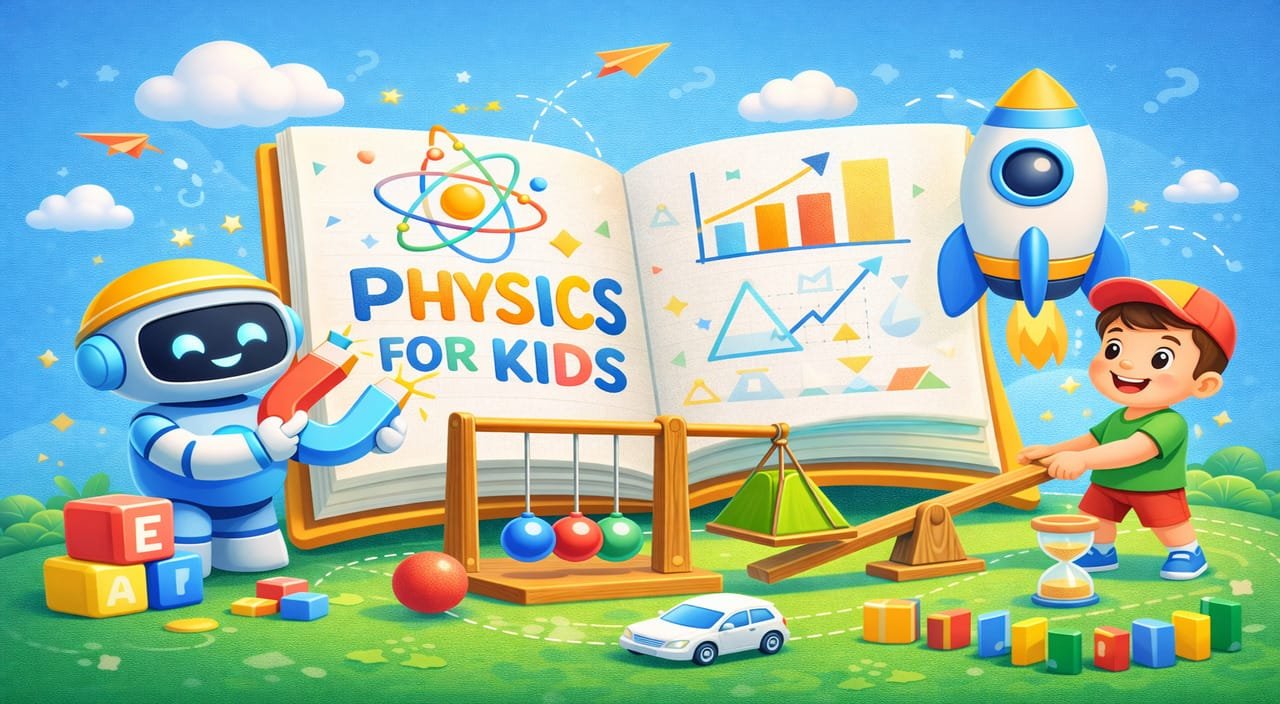Explaining complex topics to children is key for parents. This article aims to help parents talk about tough concepts with kids. We’ll look at tricks like using easy words and images, telling stories, and being empathetic.
Open talks, emotional support, and matching what you say to their age are also vital. The goal is to make kids curious, help them understand, and support their feelings.
Key Takeaways
- Explaining complex topics to children is crucial for their cognitive and emotional development.
- Using simple language, visual aids, and engaging storytelling can make difficult concepts more accessible.
- Addressing sensitive subjects with empathy and creating a safe space for open communication is essential.
- Fostering emotional intelligence and problem-solving skills helps children navigate complex situations.
- Tailoring communication strategies to different age groups ensures effective learning and understanding.
Introduction: The Importance of Explaining Complex Topics to Children
Teaching children hard stuff is key to their growth. It’s our job as parents to support their wonder and help them feel the world makes sense. With simple words, we help them know more, think hard, and build a strong base for what’s ahead.
The Role of Parents in Fostering Curiosity and Understanding
We lead our kids on paths of learning and finding. By talking openly and sparking their interest, they want to know more and understand the complex. This helps them feel sure and eager about learning new things.
The Benefits of Age-Appropriate Explanations
Adjusting what we say to how old our children are is very important. Doing this helps kids really get what we’re teaching, in a way they enjoy. It doesn’t just help them understand better. It also keeps their minds keen and ready to learn more.
How Do You Explain This and That to Kids?
Explaining hard topics to kids needs a special touch. It uses simple words, pictures, and fun stories. This way, parents help kids understand and remember even tough stuff.
Using Simple Language and Visual Aids
It’s key to use easy, kid-friendly words when talking to children about hard things. This avoids confusing jargon. Using simple words makes it easier for kids to get what you’re saying.
Adding pictures or diagrams can help too. This visual help makes complex ideas clearer and kids more interested.
Storytelling and Engaging Examples
Telling stories is a powerful tool for teaching. Creating tales around complex ideas brings them to life. It uses characters and plots that kids can relate to.
Real-life examples also work. They help connect big concepts to a child’s everyday world. This makes learning both fun and practical.
| Technique | Benefits |
|---|---|
| Using Simple Language | Ensures clear and understandable communication |
| Incorporating Visual Aids | Enhances comprehension and engagement |
| Storytelling and Engaging Examples | Makes complex ideas more accessible and memorable |
Tackling Difficult Subjects with Sensitivity
As parents, we know talking about tough things with our kids is important. This includes child abuse, safety, and other hard topics. We must be gentle, listen, and create a safe place for our kids. This helps them share their thoughts and feelings.
Addressing Child Abuse and Safety Concerns
When it’s time to talk about child abuse and staying safe, we need to be careful. We should use words they understand without making them too scared. This helps them set personal limits, spot danger, and seek help if needed. Building trust and making talking easy makes kids feel safe and supported.
Navigating Emotional Topics with Empathy
Kids may find grief, loss, or family changes tough to handle. We need to be kind, patient, and ready to listen as parents. Validating their feelings and showing them how to deal with sadness helps them cope well. This also strengthens our relationship with them.
Keeping an open mind and listening without judging is key. Our kids should feel free to talk without being afraid. This helps them understand tough things better and grow into confident, caring individuals.
The Power of Active Listening and Open Communication

Communicating well with children means more than just giving information. It’s about listening actively and making a safe, supportive space for talking openly. By showing these listening and talking behaviors, parents help their kids feel more involved and ready to share.
Creating a Safe Space for Conversations
Kids will talk more if they know they’re being understood. Parents can make a safe place for talks by really listening to their children. They should let kids share without fear of being judged.
This approach not only promotes open communication with kids but also builds a space where they’re free to talk about anything. It helps them feel safe talking about hard topics and sharing their views.
By actively listening with children and fostering parent-child dialogue, parents help their children get more interested, question more, and feel they can succeed. This way of talking and listening builds a strong, lasting relationship. It also helps kids gain skills to handle different situations as they grow.
Fostering Emotional Intelligence and Empathy
Parents are key to helping children learn about their emotional intelligence and empathy. This part shares ways to help kids name and show their feelings the right way. It looks at how to make them way better at dealing with stress and fixing problems. This helps kids manage tough times, make stronger ties, and choose wisely as they grow up.
Teaching Children to Identify and Express Emotions
Creating emotional intelligence in children starts by making them aware of their feelings. Adults should talk with their kids about various emotions, like being happy, sad, mad, or afraid. They should let kids describe what these feelings are like. Using stories and simple words, parents can help their children understand and talk about feelings safely.
Developing Coping Strategies and Problem-Solving Skills
Parents can help children handle their feelings and solve problems in positive ways. They can teach kids to calm down by breathing deep, doing mindfulness, or enjoying art or writing. Giving kids these tools lets them manage tough moments, get tougher, and solve challenges confidently.
Age-Specific Strategies for Explaining Complex Topics
Parents should adjust how they explain complex stuff to kids. Every child’s learning stage is different. So, using the right words, examples, and depth for their age is key. This ensures children really understand what they’re learning.
Approaches for Preschoolers and Early Elementary Students
For young kids, keep things simple and fun. Use bright visual aids and tell stories. Make examples easy to relate to. This grabs their attention and helps them remember better.
Remember, young kids get bored easily. So, keep talks short and clear. It’s also good to take one big idea and break it into smaller bits.
Techniques for Older Children and Teens
Older children and teens can learn about complex topics in more detail. They can handle deeper language and discussions. Encourage them to ask questions.
Talking about how things work in real life can make learning more interesting. This approach helps older kids think more deeply. It develops their critical thinking skills.
Conclusion: Nurturing Curiosity and Understanding for a Lifetime
This guide has shown us how to explain tough topics to kids. It includes fostering their curiosity, using age-appropriate explanations, and active listening. By doing this, we help our kids feel more sure of themselves and eager to learn.
Using these tips sets the stage for a life of learning and growth. It’s good for the kids and their families. Helping our kids understand the world makes them good at thinking things through, understanding others, and solving problems.
Following the advice here will make our kids love learning. It will help them talk well and understand their own feelings. The lifelong benefits of effective parent-child communication are priceless. They make kids who are always curious, strong, and caring.
FAQ
Why is it important for parents to explain complex topics to their children?
It’s key to explain complex topics for our kids’ growth. Parents help kids understand their world better. We do this by answering questions in ways they can get. This builds their thinking and learning skills.
What are some effective strategies for using simple language and visual aids to explain complex topics to kids?
Explaining tough topics needs simple talk and visuals. Using pictures, stories, or activities can make learning fun. It helps kids learn and remember well.
How can parents approach explaining difficult and sensitive subjects to children, such as issues surrounding child abuse and emotional topics?
For hard talks, use easy words and show you care. Setting a safe talk space is vital. Kids should know they can share their thoughts safely with you.
Why is active listening and open communication important when explaining complex topics to children?
Just talking isn’t enough. Listening and making a safe space is crucial. This encourages your child to share and learn more. It makes them feel valued and heard.
How can parents help foster their children’s emotional intelligence and empathy?
Parents can help children understand their feelings and respect others’. Encourage healthy ways to show emotions. This helps them handle tough times and make good choices.
What are the age-specific strategies for explaining complex topics to different age groups of children?
Changing how we talk about complex topics for each age is smart. What a teenager needs to know is different from a preschooler. This helps them understand and apply the info.





